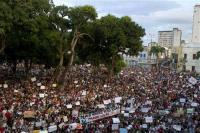The End of Lethargy in Brazil
 Our country was at the forefront of social and political struggles in the 1980s, and succeeded in preventing the introduction of neoliberalism in Brazil, so that Latin America’s “lost decade” was, for social movements and popular politicians in our country, exactly the opposite.
Our country was at the forefront of social and political struggles in the 1980s, and succeeded in preventing the introduction of neoliberalism in Brazil, so that Latin America’s “lost decade” was, for social movements and popular politicians in our country, exactly the opposite.
In those years, a strong, oppositionist unionism flourished. Strikes grew and spread, exactly the opposite of what happened in the rest of the western world where they declined and shrank. Countless social movements were born. There was a growing opposition to the military dictatorship. A National Constituent Assembly was established, and in 1989 we had an election that divided Brazil between two alternative projects.
The next decade was overwhelming: neoliberalism, the restructuring of production, financialization, deregulation, privatization and the dismantling of social programs. When the political victory of 2002 occurred with the election of Lula and his Workers Party, the scenario was profoundly different from the 1980s. The story is full of surprises, paths and detours; the 2002 election ended up transforming victory into defeat.
Lula’s govt oscillated from a lot of continuity with the neoliberal policies of Fernando Henrique Cardoso’s government to a little bit of change, but none with substance, and his first term ended so bleakly that he was forced to change direction, though always with great moderation and without confrontation. We had the “family shopping bag,” which provided federal assistance to poor families, and soaring profits for the banks. The minimum wage was raised, while the rich got richer. We had no agrarian reform, but a lot of incentives for agribusiness.
Our broken man rose from the ashes in his second term. He ended his term at a high point, as his chief of staff and future successor Dilma Rouseff demobilized almost the entire opposition movement. Anyway it was hard to oppose the former steelworker, whose support had been solidly built in the 1970s and 80s.
Those who remember his situation in 2005, mired in the scandal of the monthly allowance of thousands of dollars to buy the votes of legislators, should also remember that at the end of his term in 2010, Lula was one of the most skilled and experienced politicians. If Rousseff, his political creature—a kind of boss of iron—knew how to win the election, we here in this same space, remember that something bigger was missing: the social support that Lula had enjoyed.
With patience, critical thinking and a lot of persistence, popular movements were able to overcome this difficult cycle. They eventually realized that, in addition to economic growth and the fallacious myth of the “new middle class,” there was a deeply critical reality in all spheres of the everyday life of wage-earners.
- In the much-maligned public health system,
- the impoverished education system,
- the absurd life of the cities, littered with cars as a result of the anti-ecological incentives of the Workers Party government,
- the violence that continues to grow,
- public transportation that is among the most expensive (and unreliable) in the world,
- a World Cup stadium that enriches contractors but which is bleached white, to have no blacks or poor people. Stadiums that are crumbling, as in the case of the João Havelange Stadium, also known simply as Tricked, because it cost six times more than originally projected,
- the colossal gap between the traditional political parties and the clamor of the streets,
- and the brutal violence of the São Paulo Governor Geraldo Alckmin’s Military Police, with support from another politician, Fernando Haddad.
This helps to understand why the movement has been so quickly embraced by the population. Whatever the consequences of these movements, the country will no longer be the same. We are just beginning.
Richard Atunes is a Professor of Sociology at the State University of Campinas (Unicamp) and the author of Wealth and Poverty of Labor in Brazil, Vol II and The Meanings of Work. The translation is by Dan La Botz.
Brazil protests
This article originally appeared on June 20, 2013 in Folha de São Paulo, the newspaper with the largest circulation in Brazil. It is translated and reprinted here with the permission of the author. The original Portuguese can be found here.